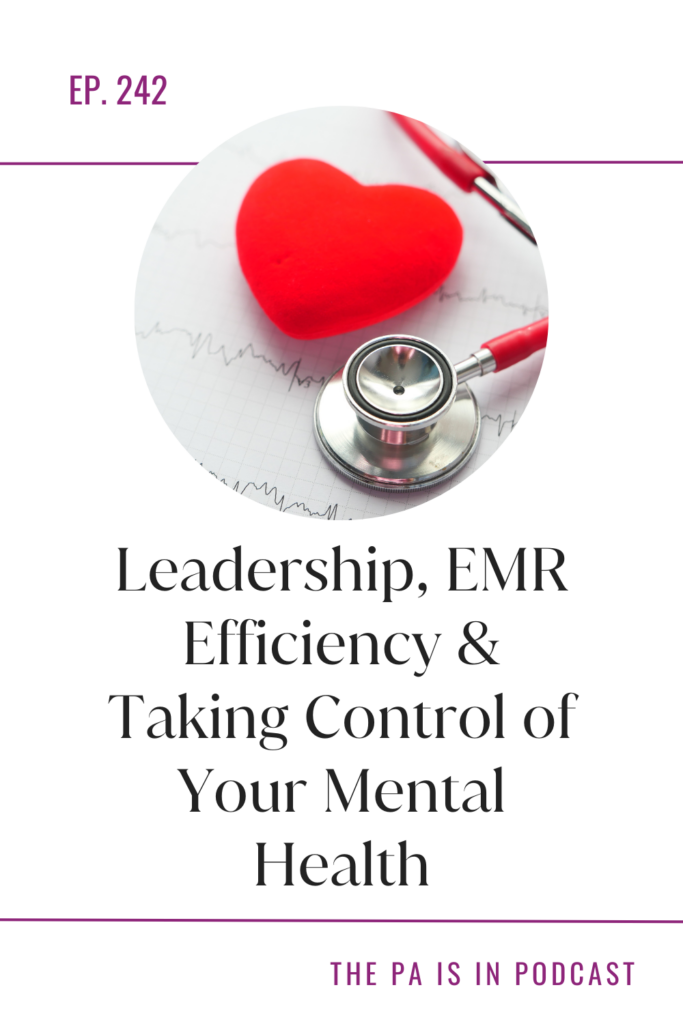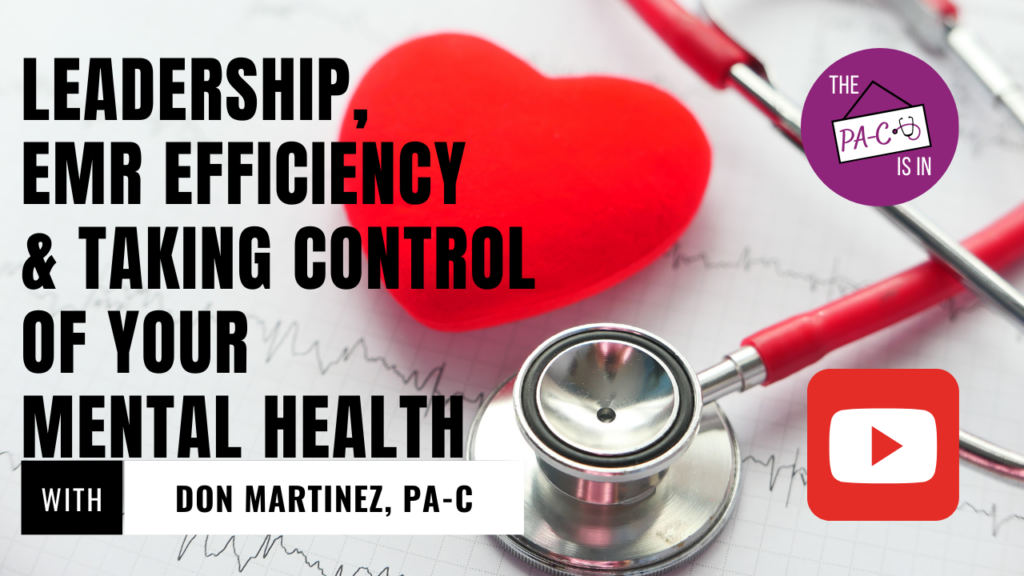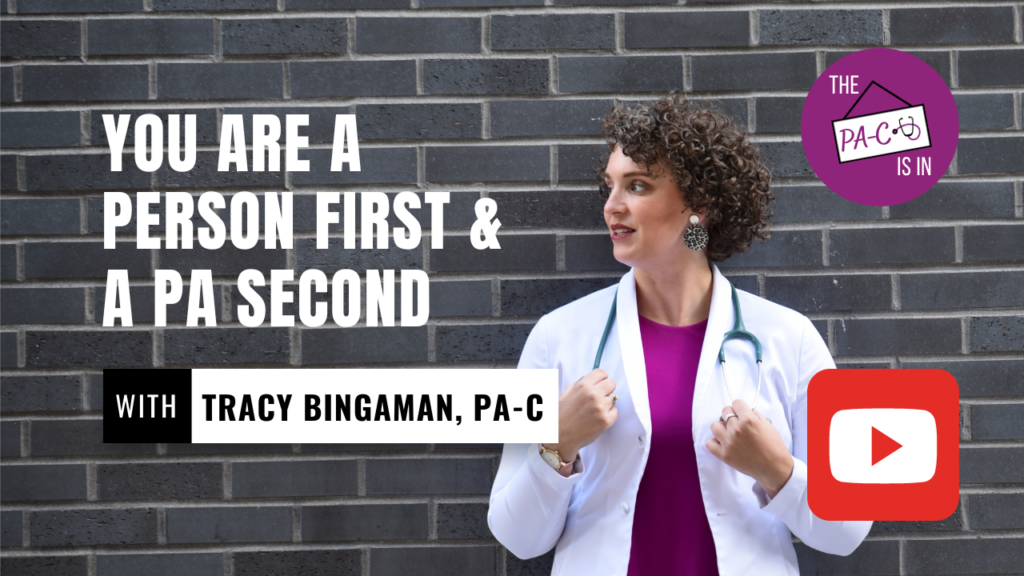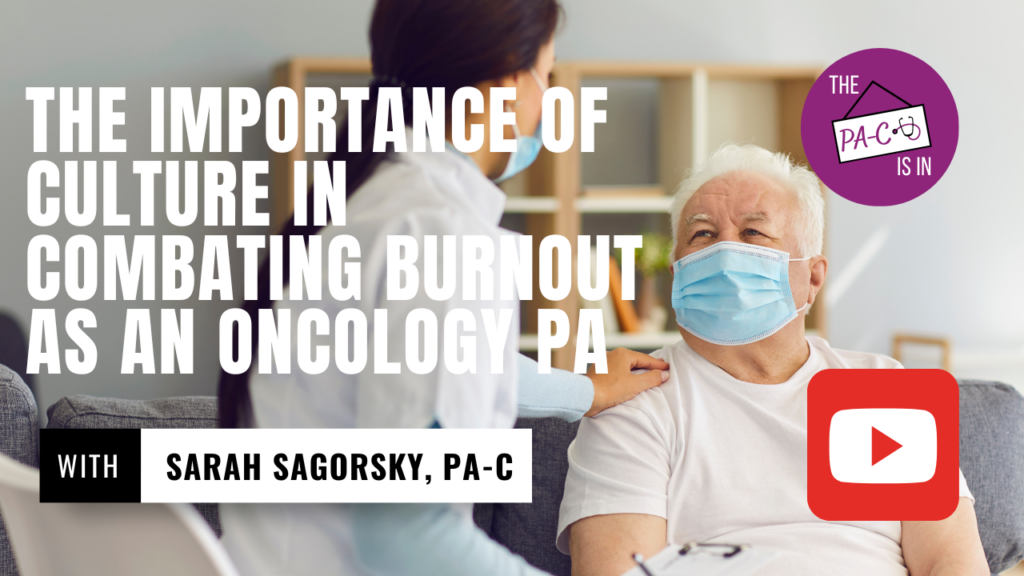
From obtaining leadership roles as a PA to becoming more efficient at EMR charting to prioritizing your mental well-being, we have it all covered in this episode of The PA Is In!
Join me as I dive deep into conversation with Don Martinez, PA-C on a wide variety of important and meaningful topics. Don is a primary care PA who now works in academia. On today’s episode, he discusses how he was able to break into leadership and administrative roles in his healthcare organization and then paved the way for future PAs and NPs to follow in his footsteps. We also talk about tips and tricks to maximize efficiency and save time charting using EMR. In the last half of our conversation, Don shares his own experience with mental health struggles and how he has now shifted his mindset and created boundaries to help protect his mental wellbeing. Don also talks about his struggles with obesity and how they have affected him as a medical provider. I appreciate his vulnerability in sharing his personal story and how his struggles have allowed him to make better connections with his patients.
We need to advocate for ourselves, both as PAs in the larger healthcare organization system and also as people who have experienced burnout and trauma while caring for our patients. Our mental and physical health and wellbeing should not come second to our patients. We can make changes both in our own lives and in our healthcare systems to create positive work-life integration.
This is an episode with so many takeaways that you’ll want to listen to again. Thanks, Don, for joining me and sharing so much wisdom! Let’s dive in!
Listen to the Podcast: Apple Podcasts | Spotify
Watch on YouTube

Don’s PA Career So Far
Don worked as a social worker for 2 years then went back to PA school and has now worked as a PA for 16 years. He initially started in family practice then moved to a community-based organization serving HIV+ pts where he provided medication management and primary care. Don then went back to family practice then moved to pediatrics for the last 7 years he worked clinically. During this time, Don also began working as an adjunct professor at the university where he went to PA school. In the last couple years, Don started working part time in administration, specifically in professional development, while also still working part time in pediatrics. In late 2022, Don left clinical practice completely and now works full time in academia at Midwestern University PA Program.
Thriving in Peds
Don calls pediatrics “the best specialty on Earth.” He loves both the patients and their parents. Don reminds PAs to remember that parents are scared oftentimes when they bring their children to the pediatric office. They feel helpless and don’t know what’s going on. It’s important to have that perspective so that you can build better relationships with the parents. Show parents that you truly care about their kiddo and want to help them get better.
Working in Professional Development
Don worked part time administratively in professional development and part time clinically in pediatrics for four years. He initially started as a volunteer. His health system had hired a director of advanced practice who wanted to unite the PAs and APRNs across the organization. There were 500 clinicians across the organization with no real structure or guidance.
Don initially volunteered to help with problem solving. He helped create a mentor program for new clinicians to be paired with more experienced clinicians and learn how to integrate into the system. With the launch of this program, the organization wanted more oversight. Don took it on as a part time job.
The program helped new graduates thrive in a large healthcare system. The organization had a hard time retaining advanced practice providers (APCs), so there were constantly lots of new grads coming in. Don helped run a new grad bootcamp where APCs could practice cases and situations in a simulation center and also learn how to access resources.
Don’s role initially involved actually teaching these programs, but then he later stepped back into a more administrative role where he focused on scheduling, updating cases, overseeing the new grad bootcamp, and problem solving if a manager had an issue with an APC. Don would help with identifying if the issue was related to professionalism, a medical knowledge deficit and whether it was an individual issue versus a systemic one. Don says it was nice to step away from the clinic, but also hard to be away because patient needs never stop.
As he worked on building and growing these programs, Don’s driving question was, “What are we doing to make these clinicians want to stay with us?” Are they going to be better clinicians at the end of this position? Will it help to grow their careers? The new grad bootcamp and mentoring program are wonderful support systems for any APC, but especially for new grads.
PAs in Leadership
Don also wanted to help PAs and APRNs rise up the ranks in leadership within his organization. He wanted to help APCs gain the necessary skills to be leaders in the larger, macro system. He believes PAs should be able to give input at the administrative level into their clinical practice. Important skill sets needed at the leadership level are communication, analysis, and problem solving.
Don wanted to give PAs this understanding in leadership skills from the beginning of their careers, so he incorporated it into the professional development program. Working in the corporate world is not that different from working in the clinical world – at the end of the day, you’re still diagnosing a problem and looking for the best solution. “Patient-centered” in this case means meeting the needs of the healthcare system while meeting the needs of the clinician.
PAs need to realize that they already have these skills, but the setting is just different. Instead of being in the clinic, they are in the boardroom. PAs need to be at the table to advocate for ourselves and to create a structure that works well for our needs.
Maximizing EMR Efficiency
The first step to maximize efficiency is to take time upfront to invest into learning the EMR system. Learn what functions are available to make your life easier. Lots of shortcuts exist in these systems. Don recommends having automatic orders and referrals saved for various diagnoses. It takes time to build these order sets in the beginning, but saves so much time later on when you’re actually seeing patients. Limiting the amount of clicks you need to do adds up and saves time overall.
It’s also beneficial to network with other colleagues. There can be lots of different ways to do the same thing. Ask other providers how they use the system to make it work for them. Use other people’s templates; you don’t need to reinvent the wheel.
Don also suggests going to EMR classes and webinars. While it might feel aggravating to go to “yet another class,” these are actually a good investment of time. You won’t receive immediate gratification, but you will experience delayed gratification once you put that knowledge to use.
Overall, Don recommends to know what you can and can’t do within your EMR. He recommends to prechart when you can and to create a rhythm that works for you. Don documents certain things in real time when he is in the room with his patients. He makes sure to verify and input patient medications and specific information only the patient can give him. This limits the number of documentation errors. Later, when completing charts in the office, Don will fill in the physical exam and other details.
When creating new templates and shortcuts, start with the most common complaints and diagnoses you see. Then slowly build other templates over time.
Don also points out that as a clinician, you may think you don’t need all this data in your notes because it seems extraneous. But from the corporate side, yes you do, because that’s what insurance companies want to see and that’s how you get paid.
Don also suggests to stop complaining about the EMR system because electronic charting is never going away. Complaining doesn’t help you become more efficient or create a more positive mindset. Working on reframing your mindset can help you improve efficiency overall.
Mental Health Struggles as Providers
As providers, we need to learn how to take good care of our patients while also taking good care of ourselves. During the COVID-19 pandemic, kids were cut off from their friends, families condensed into multigenerational homes and parents took on extra jobs to pay the bills. Don noticed a significant increase in behavioral health concerns from 2020-2033 due to pandemic and its subsequent effects. He started taking these struggles home.
There were more patients trying to get into the office to be seen and then needing more help than usual once they were there. Don was seeing a higher number of patients with more complex needs. Unfortunately, Don worked in an underserved area, especially for children, so he couldn’t always get them the resources they needed.
As most providers do, Don compartmentalized his own struggles in his personal life to focus on caring for his patients. But it only lasted so long until he began to experience burnout. Don started to see a therapist because he recognized he needed support. There is no shame in utilizing mental health services. You would get help for thyroid issues, hypertension, diabetes, so why not seek help for your mental health? Part of being a clinician is recognizing your struggles and when you need help.
Making Changes
Don started setting more firm boundaries with his job as a result of seeing a therapist. Part of his job became work from home, so he set up a pleasant, enjoyable office space. He also set a timer so that when work was done, he left the office and shut the door for the day. He took work email off his phone. Don was still able to be accessed through a work app if there was an emergency with a patient, but otherwise he was unreachable when not on the clock. Don also stopped taking add-on pts and started enforcing the late policy in the office.
It’s ok to call in sick for a mental health day when you mentally need a break and have issues with your mental health and wellbeing. Are you really hearing the patient and critically thinking if your mental wellbeing is suffering?
It’s important to take your vacation time. You are not leaving your colleagues shortchanged; it’s your organization that is failing to plan for the fact that people are using the benefits that they are entitled to have through their employment. Don was able to shift his mindset and then set boundaries to enforce what he needed to support his mental wellbeing.
In corporate medicine, business leaders rely on the personality traits of clinicians. Administration relies on the fact that clinicians put patient needs above their own. They don’t change staffing levels or add extra clinicians, but expect clinicians to see extra patients and walk ins.
All providers experience some level of trauma, from PA school to rotations to seeing the suffering and pain of the patients we care for. Healthcare is a front row seat to human suffering. Clinicians should seek therapy as a first step when they are struggling mentally. It’s an opportunity to learn tools needed to succeed.
It’s not sustainable to try and keep pushing through when your mental health is struggling.
Initially, you might feel pushback from your colleagues if you’re the only one saying no to extra patients and extra calls, but eventually it can be contagious. Other colleagues will start saying no, too. You can help build a culture where boundaries are respected and encouraged.
Weight Management as Providers
Don has struggled with obesity for much of his adult life and had bariatric surgery last year. He says that the hardest part about struggling with obesity as a medical provider is things patients think it’s ok to say, such as, “Oh you’ve really gained weight” or “What happened to you?” It took a toll on Don to keep hearing these kinds of comments. Even at work functions, colleagues would say to him, “Should you really be eating that?”
Don felt like a fraud. He was helping patients with their own weight management, but he wasn’t doing it himself.
Don handled those types of comments in several ways – sometimes by deflecting or making a joke. But Don says the best approach he used was to openly connect with a patient and say, “I’m here myself. I want you to be as healthy as you can be and take care of yourself, like I’m trying to do for myself.”
Don describes how it could be very uncomfortable coming into the office because he would overhear people make comments about him and his size. He felt like patients judged him for recommending diet and exercise, but he was not doing these things himself. He felt very self-conscious having weight management discussions with patients.
During the COVID-19 pandemic, coping mechanisms and access to resources were limited. Don recognizes that he survived a pandemic, family health scares, and other personal struggles. He tries to give himself grace. As a society, we’ve been through a lot of trauma, so he extends that same grace to patients. He uses his experience to connect with patients and to receive patient buy in. This struggle helped enhance his clinical practice and connect deeper with patients by being more vulnerable. It helps to break down walls when patients can see you as a person, not just a provider.
Connect with Tracy
Other Posts and Videos You’ll Love
Episode 210: You Are More than a PA; You Are a Person: Listen to the Podcast | Watch on YouTube | Read the blog

Episode 161: Listen to the podcast | Watch on YouTube | Read the blog post

Episode 225: Your Wok-Life Balance and Negotiation Questions Answered: Listen to the podcast | Watch on YouTube

Episode 207: Are You Thriving or Surviving as a Healthcare Worker?: Listen to the podcast | Watch on YouTube

Episode 227: The Importance of Culture in Combating Burnout as an Oncology PA: Listen to the podcast | Watch on YouTube | Read the blog post

Episode 158: The Future of the PA Profession?: Listen to the podcast | Watch on YouTube | Read the blog post

Episode 215: The Anatomy of a Healthy Boundary: Listen to the podcast | Watch on YouTube | Read the blog post
